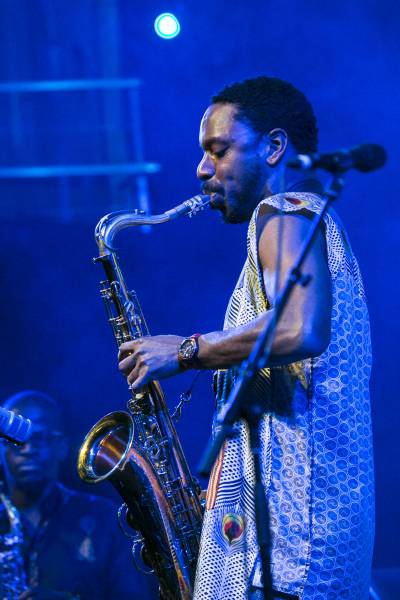City Recital Hall, January 24
8.5/10

In the 1960s South Africa became a crucible for some of the world’s most vibrant jazz. Apartheid drove away many of the key musicians, mostly to London (electrifying that city’s jazz scene), while the great pianist-composer Abdullah Ibrahim and the trumpeter Hugh Masekela (who has just passed away) made for the US. Their music highlighted jazz’s ability to be a global improvisational language with an infinite capacity to absorb local musical dialects.
Enter the brilliant British saxophonist Shabaka Hutchings, who, no doubt aware of this rich history, in 2016 recorded with the cream of South Africa’s contemporary jazz players in Johannesburg. The resultant Wisdom of the Elders was presented here as a contiguous suite: an exhilarating journey that, like many rivulets feeding into a mighty waterway, drew on the music of not just South Africa, but Africa more broadly, the Caribbean (where Hutchings’ own roots lie) and of course the US (with nods to the likes of Sun Ra and the Art Ensemble of Chicago).
The South Africans’ trademark exuberance was ideal for detonating Hutchings’ explosive tenor solos, while his compositions, brimming with mesmeric chants and anthemic melodies, presented wide-open fields upon which to improvise.

Singer Siyabonga Mthembu won’t die wondering what might have happened had told us what he really thought about patriarchies, misogyny, racism and ecological vandalism, and he delivered his chanted messages with such a potent voice and blazing eyes, and yet with such sincere benignity, that one weathered and even embraced the overt didacticism.
Saxophonist Mthunzi Mvubu added a piquant alto sound to his bold, acute-angled lines, and the combination of Ariel Zamonsky (bass), Tuni Mogorosi (drums) and Gontse Makhene (percussion) provided crashing rhythmic waves for the horns and voice to ride. Hutchings’ sound was as vast and warm as a summer wind, and on several solos he attained monumental – almost ferocious – energy and intensity. Yet implicit in his playing was also an expression of the surrounding South African aesthetic, in which any sadness or anger always finds its corollary in joy.